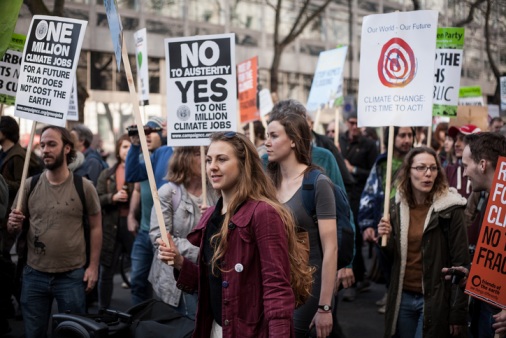DAS examines your legal rights to protest

The right to peaceful protest
The right to peaceful protest in the UK is expressly guaranteed under European Convention of Human Rights (ECHR). But how does that translate into our law? What is the current UK law on protesting?
Protesters
There are many cases throughout history of peaceful protest being used to great effect and changing the world. However, they are viewed by many as a public nuisance, and at worst, a situation in which hostility and violence could break out.
The right to protest has been restricted somewhat in modern UK law, and it is not uncommon to hear calls to tighten those restrictions with every outbreak of violence in the wake of a protest.
Fortunately, the ECHR, in Article 10, the Right to Freedom of Expression, and Article 11, the Right to Peaceful Assembly, allows for peaceful protest.
Knowing the restrictions placed upon peaceful protest can ensure that the message of your protest is heard.
Organising a protest
When you are planning a protest, you do not necessarily need to inform the authorities – however, doing so could prevent unnecessary trouble or difficulties from arising on the day.
Police are more likely to be co-operative if they have good warning in advance of what to expect, and if they have a clear point of contact amongst the organisers of the protest. It is also more likely to reassure them that those organising the protest have made adequate considerations to make sure everything goes smoothly.
It may also turn out that you need a permit to protest in the area in which you wish to protest. Failing to gain this permit beforehand could lead to your protest being shut down, so it is worth contacting the police to find out whether you will need one.
However, bear in mind that informing of the police will cause them to restrict or prevent your protest before it even gets started. Any communication you make with the police could be used against you in court if the police decide to charge you for organising an illegal demonstration.
Challenging police conditions
The Police do have powers under the law to impose restrictions on planned protests. However, these restrictions are unique to each case, and your rights give you the option to appeal against any restrictions that the police attempt to make on your right to organise your protest.
If you believe unfair restrictions have been placed on your protest, or the protest has been banned from occurring altogether, you may be able to make a case on one of three grounds.
The decision-making process behind the restrictions was unsatisfactory – for example, if false or assumed information was factored into the decision;
The restrictions would contravene the right to protest given to all under the ECHR – for example, if police decided that the message behind the protest was too unsavoury to be allowed, violating Article 10;
The decision is otherwise completely unreasonable or irrational – for example, a schoolboy organising a protest against the closure of his local library, and having it banned by police for fear of a violent outbreak of public disorder.
Police can only place restrictions on a protest or demonstration if they have reason to believe that it will result in property damage, disruption of the community or serious public disorder.
Judicial challenges against these restrictions can only be made at the High Court. The restrictions may be imposed too late for a judicial challenge to be possible, and if you choose to go ahead with the protest in spite of these restrictions, you or your fellow protesters could find yourself placed under arrest.
However, if charges are brought against any protesters and it is found that the restrictions supporting those charges were unreasonable, charges would be dropped and the arrested protesters could be awarded compensation. Going ahead with your protest on this hope is very risky, and it is worth considering the rescheduling of your protest, or at least seeking legal advice.
Stop and search powers at protests
Contrary to what you might believe, police powers to stop and search are the same at a protest as they are anywhere else. Police can only stop and search an individual if they have reasonable cause, and being present at a protest does not constitute reasonable cause.
Authored by DAS
About DAS Group
The DAS UK Group comprises an insurance company (DAS Legal Expenses Insurance Company Ltd), a law firm (DAS Law), and an after the event (ATE) legal expenses division.
DAS UK introduced legal expenses insurance (LEI) in 1975, protecting individuals and businesses against the unforeseen costs involved in a legal dispute. In 2018 it wrote more than seven million policies.
The company offers a range of insurance and assistance add-on products suitable for landlords, homeowners, motorists, groups and business owners, while it’s after the event legal expenses insurance division offers civil litigation, clinical negligence and personal injury products. In 2013, DAS also acquired its own law firm – DAS Law – enabling it to leverage the firm’s expertise to provide its customers with access to legal advice and representation.
DAS UK is part of the ERGO Group, one of Europe’s largest insurance groups (the majority shareholder in ERGO is Munich Re, one of the world’s largest reinsurers).

